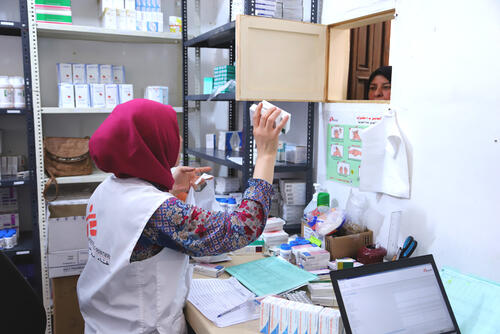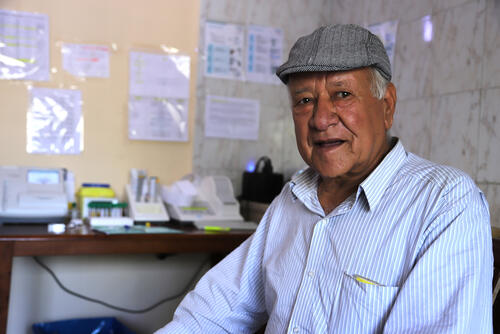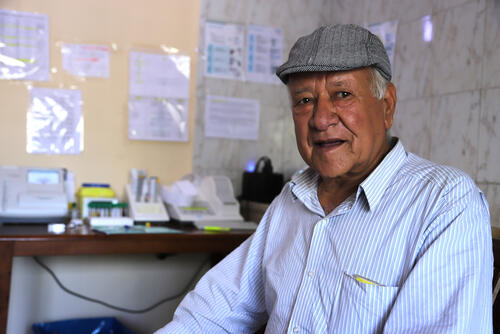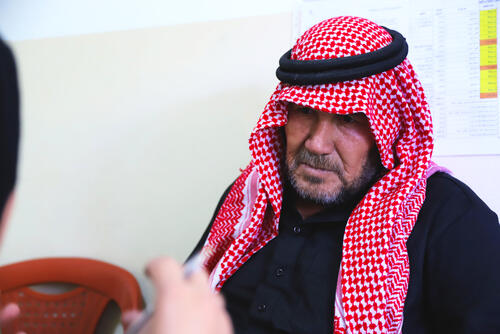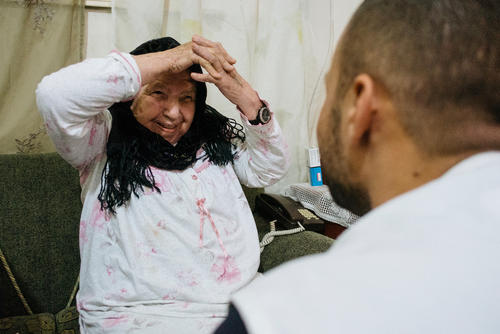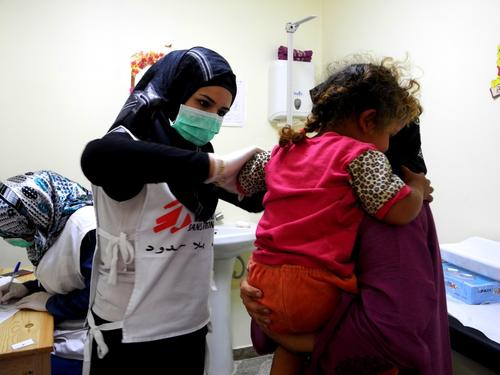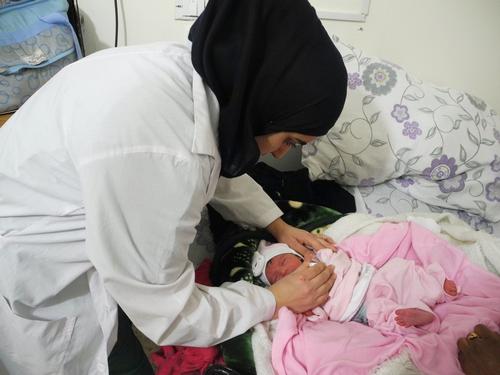Abdelhameed, 75, from Arsal in Lebanon and Abdellatif, 56, from al-Qusayr in Syria might not know each other, but what they have in common is more than just the similarity between their names. Abdelhameed and Abdellatif have both lost everything to war, Abdelhameed to the Lebanese civil war years ago and Abdellatif to the war in Syria, which forced him to flee. Likewise, they have both been diagnosed with chronic illnesses and neither would be able to afford medical care without the assistance of MSF’s medical team in Arsal.
MSF began working in Arsal, on the Lebanese border with Syria, in 2012 and has been continuously providing free medical care for vulnerable communities of both Syrian refugees and local Lebanese residents ever since.
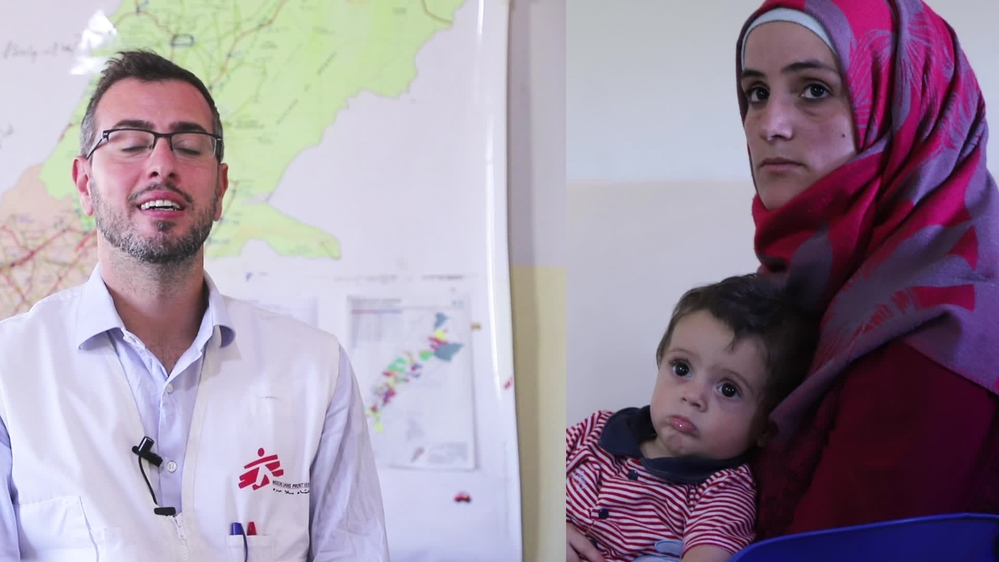
Arsal clinic - interview HOM - EN
MSF’s Bekaa project coordinator, Sergio Bianchi, explains why MSF first began working here: “Arsal was strongly affected by the Syrian crisis. Not only does it host a high number of refugees, but the residents of Arsal suffered from instability with armed groups present in the area for years. During this period, access to the town was limited, which had a huge impact on the living conditions in the town, the delivery of international humanitarian assistance, and the access of Arsal’s residents to basic services. MSF started providing primary healthcare services and mother and child care, free of charge, in order to ensure the availability of these services through these tough times in Arsal.”
It was no easy feat for MSF to continue providing medical services in Arsal over the years. Our teams faced numerous challenges, mainly related to security but also due to the lack of other aid organisations in the town. The battle of Arsal in summer 2017 pushed armed groups from the area completely and brought relative stability to the town. As a result, MSF was able to step up its response, developing outreach activities in the community as well as reinforcing the team with expert international staff.
Yet, despite the improvement in the security situation in Arsal over the past year, the humanitarian situation has virtually not improved at all. Humanitarian agencies remain largely absent, while medical and humanitarian needs among both the Syrian and Lebanese residents remain extremely high.
“Despite the relative stability, there are few organisations in this town providing primary healthcare,” Bianchi explains. “Specialised secondary healthcare services are just not accessible to the community as only two field hospitals, both with limited capacity, are present in Arsal.”
“Our teams all struggle to refer patients, especially newborns and those needing specialised chronic diseases care or psychiatric services. For instance, it could take two to three hours to refer a baby that needs an incubator from our clinic. This is because most patients need to be sent outside Arsal, to Zahle, Beirut, or even Saida. Furthermore, some of our patients do not have the papers that allow them to travel.”
One such patient was Ahmed, just 57 days old. He arrived at MSF’s clinic in a critical condition and was diagnosed with sepsis. He needed an urgent referral to another hospital for tests and treatment, but his doctor was forced to call around for hours before a hospital would accept him.
Likewise, pregnant women struggle to access safe delivery services and affordable antenatal and postnatal care. MSF’s maternity clinic assists 80 normal deliveries each month.
“I delivered my first baby in MSF’s clinic,” says Gharam, who is five months pregnant. “I’m currently receiving antenatal care and will deliver my second baby here too. The care I received was good, and the services are free. I can’t afford to deliver in another centre.”
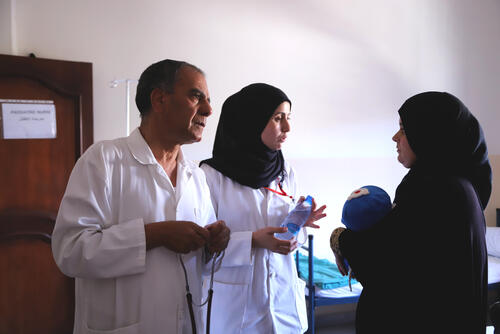
Back in the chronic diseases clinic, Abdelhameed, who suffers with diabetes, awaits his consultation. The door to the doctor’s room opens. Abdullatif picks up his belongings and his medication to head home. He really understands the importance of committing to medication and follow-up visits because his diabetes deteriorated when he first fled to Lebanon from Syria. “We lived through a difficult security situation in Arsal, where it was hard to travel. Still, we could come to this clinic. It never closed,” says Abdellatif.
Abdelhameed sits down with the doctor; he recently needed emergency surgery. He had to be hospitalised in Zahle and, even with the contribution from the social security fund, he had to pay US$1000 to cover the costs.
“The fact is that the health needs of people in Arsal are not being met by the services offered in Arsal today. This gap is especially serious at the secondary healthcare level. More assistance is needed in Arsal in order to meet the needs of both the Syrian and Lebanese populations, who are in urgent need of quality, affordable care,” Bianchi concludes.
Abdelhameed Al-Hujairi
Abdelhameed Al-Hujairi, 75, is a Lebanese man from Arsal. He has six children. The entire family stayed in Arsal, even throughout the deteriorating security situation, because as he says, “Where else would we go?”
Abdelhameed has had diabetes for 20 years and has been visiting MSF’s primary healthcare centre in Arsal, where he receives regular follow-up care and treatment, free of charge, since 2016.
Before he learned about the centre, he would buy medication only when he could afford the cost
As a young man, Abdelhameed immigrated to Libya and spent 25 years working in excavation and sanitation. He returned to Lebanon and continued working, believing that he had saved enough money to allow for a good life, but his fortune depreciated due to the Lebanese civil war.
As job opportunities became scarce and Arsal faced tough security and economic circumstances his situation only grew worse.
Earlier this year, Abdelhameed needed emergency surgery but since specialised healthcare services are not available in Arsal, he had to undergo the procedure in Zahle and needed to pay US$1,000 to cover the costs, even after the contribution of the social security fund.
He scraped together the money and overcame his medical emergency, but he still suffers with chronic diseases, so he visits MSF’s clinic regularly. He adopted a healthy lifestyle to avoid further complications.
Abdellatif
Abdellatif, 56, from Al-Qusayr, fled his home in the Homs governorate of Syria in 2013.He’s been living the in a refugee camp in Arsal ever since and has been struggling with diabetes for 18 years.
Since the war began, he’s witnessed damage to his farmlands and the destruction of his house. His wife and two of his children have been injured by shelling and they were all forced to flee and leave behind everything he ever owned.
After seeking refuge in Lebanon, Abdellatif’s life changed completely.
Back in Syria, he owned a big house and a number of farmlands where he used to grow fruit, vegetables, and grain. His harvest gave him a healthy diet which helped him avoid complications with his diabetes.
Today, he lives in a tent. He has not found a job and can’t feed his children or purchase his medications. Before, Abdellatif was known for his sense of pride and was respected in the community, but during the last of his days in Syria and throughout his time in Lebanon his physical and mental health has deteriorated.
Abdellatif is grateful for MSF’s efforts to help Arsal’s residents and refugees, because without its continuous presence in Arsal since 2012, he and hundreds of others would have had to figure out a way to get medication on their own. This would have been practically impossible given the security situation in Arsal during previous years.
In Arsal MSF provides paediatric consultations, a chronic diseases care programme, sexual and reproductive health services (including normal deliveries), mental health consultations and health promotion activities. All medical services and medications are provided free of charge.



